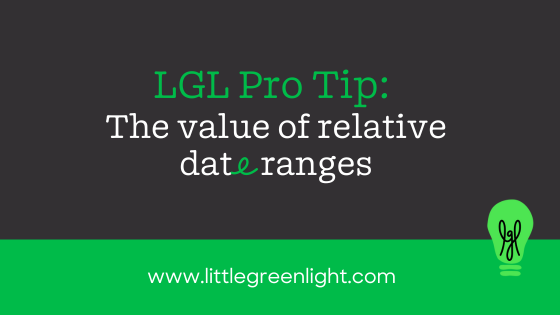Little Green Light is a cloud-based donor management system for fundraisers.
Subscribe to get our latest product updates, best practices and tips to grow your nonprofit.

It is super useful to be able to schedule reports, to save searches, and to create constituent lists in Little Green Light that automatically update. But if any of those are based on dates, you absolutely need to know about and be using relative date ranges.
Let’s start with an example.
Every Monday, I need to see a list of any first-time donors from last week.
If I’m running that search on September 1, 2025, I can set the exact dates I need to include, from August 25 to August 31. My search would look like this:
This would work fine on September 1. But if I re-run the same search a week later, I would still be looking at donors from that last week in August, which is not the data I need.
Instead, I can set the date range to use relative dates. In this case, I will select the value “Last week rel.” (“rel.” stands for “relative” here) from the date dropdown menu, and “last week” will be populated into my date fields.
Now I have a much more useful search. I can save this search, re-run it whenever I want, and it will pull first-time donors from the prior week. I can use this search as the basis for a scheduled report or for a constituent list.
There are a handful of built-in relative date range options in the LGL date picker:
Yesterday rel.
Today rel.
Tomorrow rel.
Last week rel.
This week rel.
Next week rel.
Last month rel.
This month rel.
Next month rel.
Quite a few of the other date selections also work as relative dates. These all populate the date fields using the regular text expression for the dates. Just look in the start and end date fields, and if they contain regular text (as opposed to a specific date) they are using a relative date:
Last quarter
This quarter
Next quarter
Last fiscal
This fiscal
Next fiscal
and many more
As the ultimate bonus, you can write your own custom relative date search. For example, you might want a search that pulls up people who last donated between 2 years ago and 1 year ago from the date you are running the search for. You can create a custom relative date entry by typing in “730 days ago” and “365 days ago”. That search would look like this:
You can also create your own relative date ranges using “days ago”, “weeks ago”, or “months ago”.
Conclusion
We hope you enjoy using this relative date range option in LGL as you identify stewardship opportunities among all your constituents.
Check out our LGL Pro Tip Archives for even more ideas!
Ready to try LGL? Get your first 30 days free. No credit card required.